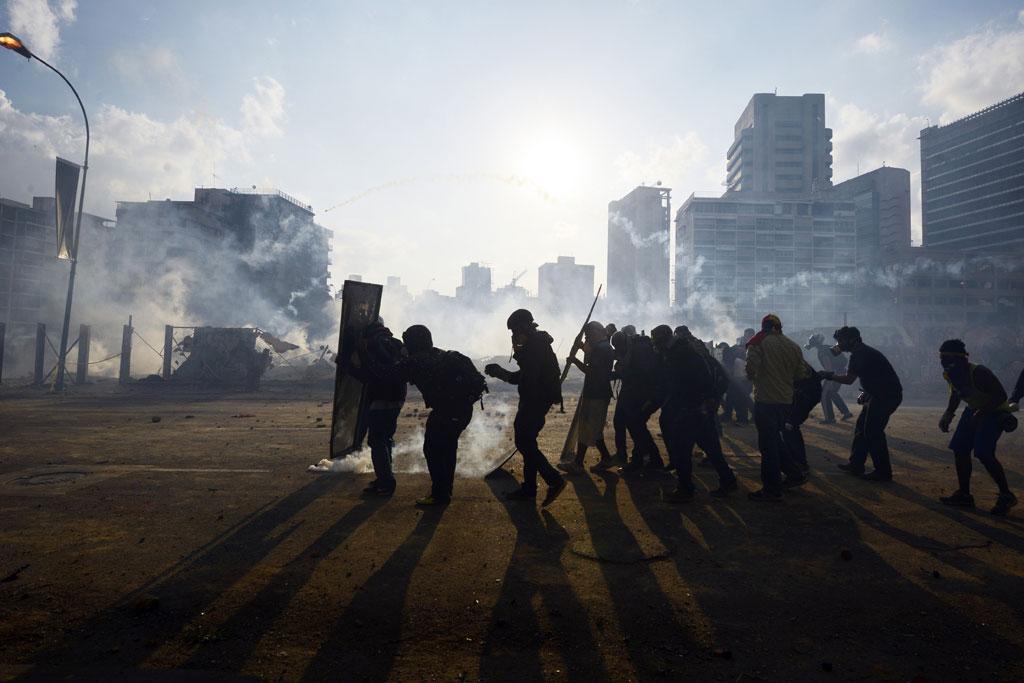Death toll in Venezuela clashes climbs to 29
Demonstrators clash with the police during a protest against Venezuelan President Nicolas Maduro, in Caracas on March 16, 2014.
A National Guard captain who was shot in the head during a demonstration in Venezuela died on Monday, the military said, becoming the 29th fatality from weeks of clashes between protesters and the security forces.
General Padrino Lopez, head of the armed forces' strategic operational command, said the captain was shot late on Sunday at a street barricade set up by demonstrators in the central city of Maracay, in Aragua state.
"He was another victim of terrorist violence," Lopez said on Twitter, calling for an end to the confrontations.
"Our armed forces don't repress peaceful protests, they protect them … much more Venezuelan blood would've been shed, if it were not for the responsible actions of our National Guard."
For six weeks, students and hardline opposition leaders have been calling supporters onto the streets in protest at President Nicolas Maduro and his socialist government.
The demonstrators are demanding political change and an end to high inflation, shortages of basic foods and one of the worst rates of violent crime in the world.
More from GlobalPost: Venezuela's protests careen into week 5
The protests, however, show no signs of toppling Maduro, a 51-year-old former bus driver who narrowly won an election in April 2013 to replace his late friend and mentor, Hugo Chavez.
The armed forces seem to be firmly behind Maduro, and the numbers of protesters are far fewer than took to the streets a decade ago to oust Chavez, albeit briefly. Opposition leaders, meanwhile, are deeply divided over the current confrontations.
During the daytime, thousands of opposition supporters have marched peacefully. Then a masked hard core has been emerging in the evenings, especially in wealthier eastern Caracas, to fight running battles with riot police and the National Guard.
Troops take plaza
Supporters of both political camps, and several members of the security forces, have been killed. Hundreds of people have been injured, and more than 1,500 have been arrested.
About 100 people remain behind bars, including 21 security officials accused of crimes ranging from brutality to homicide.
In the western border state of Tachira, which has been hardest hit by the violence, residents rebuilt some barricades overnight on streets that the authorities had cleared.
In Caracas on Sunday, National Guard troops fired tear gas and water cannons to clear anti-government demonstrators from Plaza Altamira, a square in the wealthy east of the capital that became the wreckage-strewn site of daily violent clashes.
"For a month this was the object of terrorism and vandalism," Information Minister Delcy Rodriguez told state TV at the square, which features an obelisk, fountain, and view of the Avila mountain that towers above the city.
"Today it is a territory of peace."
National Guard troops posted around the plaza said they had seized home-made shields, materials for Molotov cocktails, and medicines used by the protesters to counteract tear gas.
As they searched the bags of some passers-by, they told a Reuters reporter they were deployed to the area for 15 days.
Cenaida Pavon, a 40-year-old secretary who was walking through the square, said she supported the demonstrators' right to protest peacefully, but not the destruction of property.
"They hate what President Chavez left behind," she said, adding that the nearby school attended by her eight-year-old son had been closed since the start of the demonstrations.
"That's terrorism, not protest," Pavon said.
(Additional reporting by Javier Faria in San Cristobal; Editing by James Dalgleish)
Every day, reporters and producers at The World are hard at work bringing you human-centered news from across the globe. But we can’t do it without you. We need your support to ensure we can continue this work for another year.
Make a gift today, and you’ll help us unlock a matching gift of $67,000!
